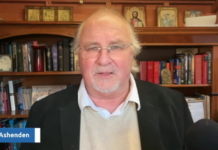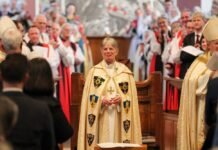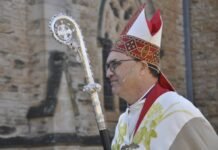From 1st October 2023, the College is changing its relationship with the University of Oxford and looking to a new future focused on its core status as an Anglican theological college. In this interview with the Principal, Robin Ward, we explore what the upcoming change means for the College, and what the future looks like for St Stephen’s House.
Can you share more about the changes currently taking place at the College?
Yes. After 20 happy and successful years as a permanent private hall (PPH) within the University of Oxford, the College’s House Council has reviewed its commitment to the College’s core mission, and as part of this, from October 2023, we will have a new relationship with the University, with the formal status of an Anglican theological college.
Why has this change of relationship with the University taken place?
In 2003, when St Stephen’s House first became a PPH, almost all our ordinand students were studying for Oxford qualifications. However, since the introduction of the Church of England’s Common Award, in partnership with the University of Durham, many of our students have chosen to study on this pathway.
Our new relationship with the University of Oxford means we can maintain relationships with both Durham and Oxford Universities and in turn offer the widest range of courses to ordinands. It also means that we can respond to the way in which training and professional development is moving and in doing so, to better support the overall aspirations that the Church of England has for both lay and ministerial formation.
What does this mean for the College?
It means that we have secured a future for the College in which we can continue to offer qualifications appropriate for ordinands of every educational background and every age. This was a key aim of the House Council.
Whilst it does mean that we will no longer welcome other cohorts of students, such as teachers, who have studied with us since 2003, it means that we can develop new ways to offer development and education – both remote and in person – to both ordinands and those who are already ordained.
Will the focus moving forward be solely on ordinands and those already ordained?
Yes. And that was one of the more challenging aspects of the decision. The cohort of non-ordinand students and in particular trainee teachers has contributed enormously to the life of the College community over the last 20 years, and I – together with many who have studied and lived alongside them – am thankful to them for this.
How will the College be developing its core offering moving forward?
Last year saw the launch of the Edward King Centre, the College’s online learning portal, which is our response to the way in which we see people increasingly want to learn, and indeed the way that training and professional development is moving.
The Edward King Centre will be an important part of the College’s offering moving forward, alongside the core residential training we currently offer. It will enable people all over the UK and wider world the chance to access the internationally-renown academic excellence and teaching that takes place at the College, and to access it in a way that suits them, which is often online.
We also hope to expand the range of subjects we offer. For example, we’re currently considering the topic of Canon Law.
At a practical level, what changes will take place at the College?
We have, with the support of a substantial grant from the Fellowship of Saint John, been able to lay very strong foundations for the first cohort of students studying for the Masters in Theology course through the Edward King Centre. Some staff time will be dedicated to delivering this course, alongside their teaching of residential ordinand courses.
As part of our aspiration to deepen and expand our educational offering, we’re delighted that Dr Ian Boxall will be returning to the College as Senior Tutor following his time at The Catholic University of America in Washington, USA. As well as bringing his skills teaching New Testament studies, he also brings expertise in delivering online and virtual teaching, which will be a great asset to the College.
Finally, with the pressure on college rooms reduced in the immediate term, we are in the fortunate position of being able to welcome more visiting academics from around the world, as well as those on retreat or sabbaticals. I expect this to contribute greatly to our aim of widening our offering and expanding our community beyond Oxford.
Any parting thoughts?
In a few years, the College will celebrate the 150th year of its founding by Bishop Edward King. It is a great responsibility to be leading this exciting new chapter for the College. I believe it is the trajectory which stays truest to the College’s founding – and still core – mission: to train priests in the Anglo-Catholic tradition, whilst evolving and responding to new ways of teaching and learning and making the very best of what we have here to enhance lay and clergy lifelong learning.



